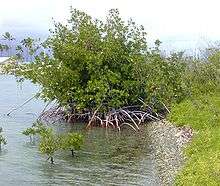Dominance (ecology)

Rhizophoraceae (mangroves) dominate tropical tidal swamps
Ecological dominance is the degree to which a taxon is more numerous than its competitors in an ecological community, or makes up more of the biomass. Most ecological communities are defined by their dominant species.
- In many examples of wet woodland in western Europe, the dominant tree is alder (Alnus glutinosa).
- In temperate bogs, the dominant vegetation is usually species of Sphagnum moss.
- Tidal swamps in the tropics are usually dominated by species of mangrove (Rhizophoraceae)
- Some sea floor communities are dominated by brittle stars.
- Exposed rocky shorelines are dominated by sessile organisms such as barnacles and limpets.
See also
- National Vegetation Classification, a system for classifying British plant communities by their dominant species
- Monodominance
This article is issued from
Wikipedia.
The text is licensed under Creative Commons - Attribution - Sharealike.
Additional terms may apply for the media files.